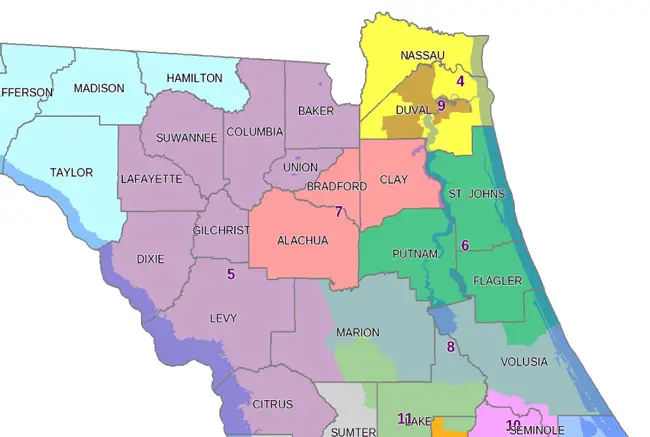
While much of the state’s political establishment has focused on the congressional redistricting lawsuit and its possible effects on future elections, a related fight over the map for the state Senate is continuing.
That case could eventually lead to new districts for the 40-member upper chamber, which, like the state House, is currently dominated by Republicans. Any final ruling against that plan would require a third draft of the Senate districts after the Florida Supreme Court tossed the original lawmaker-approved plan two years ago.
For now, both sides are still working to discover evidence for an eventual courtroom clash on the Senate map. Meanwhile, a coalition of voting-rights organizations that includes the League of Women Voters of Florida is continuing the legal fight over the state’s congressional map, which was redrawn after Leon County Circuit Court Judge Terry Lewis ruled it unconstitutional in July.
Lewis has since accepted a second draft of the congressional map and rejected the coalition’s efforts to push back the 2014 elections and put the new plan in place immediately. The plaintiffs have appealed that ruling, saying voters should not be forced to cast ballots in unconstitutional districts.
“We will be moving ahead with the Senate case in due course,” Lisa Hall, a spokeswoman for the plaintiffs, said in an email. “Work is ongoing and there is no set timetable at this time.”
The eventual Senate case also would be centered on the core of the congressional lawsuit — whether the Legislature complied with the anti-gerrymandering Fair Districts amendments, put into the Florida Constitution by voters in 2010.
Similar evidence could also be used.
During the congressional trial, the redistricting process itself came under attack, with plaintiffs arguing that the redistricting process was shrouded in secrecy. Lawyers for the Legislature argued that the process was transparent and that maps were drawn that followed the amendments. Lewis eventually ruled that GOP operatives “managed to taint the redistricting process and the resulting map with improper partisan intent” but agreed that the Legislature tried to keep politics out of the process.
“We are very confident in the Senate case and some of what happened in the Congressional case enhances that confidence,” Hall said.
The Legislature disagrees.
“The politically motivated challenges of the Democrat organizations financing the lawsuit against the Senate map, which has already been approved by the Florida Supreme Court, are separate and distinct from their challenges to the congressional map. … It would be imprudent to comment further on that pending litigation at this time,” Katie Betta, a spokeswoman for Senate President Don Gaetz, said in an email.
The Senate case has taken a more circuitous route to trial than the congressional map did. The Legislature originally fought the Senate challenge on the grounds that the case couldn’t be heard after a Supreme Court ruling on the Senate map in 2012. That ruling didn’t include congressional districts.
Under the Florida Constitution, the court immediately considers the constitutionality of maps for the two legislative chambers. Justices threw out the first draft of the Senate maps in 2012 after a quick review, then approved a second version that was passed in response to that decision.
The constitution also says decisions from those Supreme Court reviews “shall be binding upon all the citizens of the state.” But in a 5-2 ruling last year, the court said that didn’t apply to more fact-intensive lawsuits than the automatic reviews, and that the Senate case could proceed.





























Leave a Reply